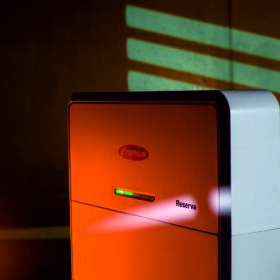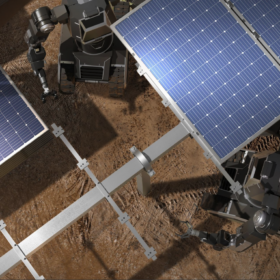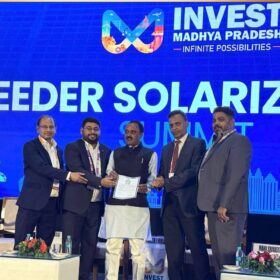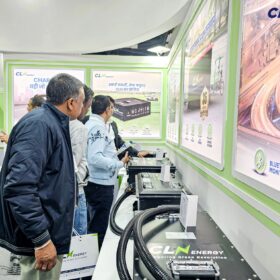Fronius introduces 15.8 kWh lithium iron phosphate battery for rooftop PV
The Austrian manufacturer has launched its first battery system using LFP cells. A total of up to four units can be connected in parallel for a capacity of 63 kWh.
Bry-Air enters green hydrogen segment with air-to-water generators
Deepak Pahwa, chairman of the Pahwa Group and managing director of Bry-Air, told pv magazine, Bry-Air has already undertaken an air-to-water generation prototype for a green hydrogen project in a desert region outside India. When the prototype is up and running, 500 units of the system will be installed to produce huge quantity of hydrogen.
Colored modules for building-integrated photovoltaics
Taking inspiration from the 3D photonic structures on a Morpho butterfly’s shimmering blue wings, scientists at Germany’s Fraunhofer Institute for Solar Energy Systems ISE have developed colored solar panels that can be incorporated into a building’s exterior practically invisibly while maintaining high efficiency.
Robotic workers unveiled at Intersolar
RoboForce says its AI-enabled robots can install modules “faster and cheaper” than human workers.
GP Eco Solutions to set up 5 GW solar panel, 2 GW cell manufacturing facility in Madhya Pradesh
GP Eco Solutions India has signed a Memorandum of Understanding (MoU) with the Government of Madhya Pradesh to set up manufacturing facility for 5 GW of solar panels and 2 GW of cells in Madhya Pradesh.
Tata Power arm wins contract to supply 292.5 MWp DCR solar modules
TP Solar has secured a contract from the Solar Energy Corp of India Ltd (SECI) to supply 292.5 MWp of PV modules complying with the Domestic Content Requirement.
CLN Energy secures $5 million lithium battery, related products order from Singaporean company
CLN Energy has secured an order with a Singapore-based multinational company to supply lithium-ion batteries, cabinets and other related items.
‘Solar module prices will soon go back to over $0.12/W’
The global solar module industry is expected to regain a sustainable balance in the next six months, Yana Hryshko, head of Solar Supply Chain Research for Wood Mackenzie, told pv magazine. She explains why solar module prices may increase soon, suggesting that Tier 1 modules prices could reach $0.14-$0.15/W by the end of this year, and discusses how consolidation is materializing within the global PV industry.
Teerth Gopicon to build 3 GW solar cell, module factory in Madhya Pradesh
Teerth Gopicon, an EPC player, will invest INR 1,500 crore in setting up a 3 GW of TOPCon solar cell and module manufacturing facility in the State of Madhya Pradesh.
Adani Green arm secures 1.25 GW pumped storage offtake agreement with UPPCL
Adani Green Energy’s arm Adani Saur Urja has received a long-term offtake deal with Uttar Pradesh Power Corp. Ltd (UPPCL) for 1,250 MW energy storage capacity from pumped hydro storage projects.















